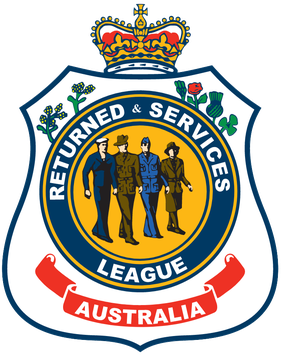Returned and Services League of Australia
 |
|
| Abbreviation | RSL |
|---|---|
| Formation | 1916 |
| Type | Ex-service organisation |
| Legal status | Charity |
|
Membership (2015)
|
170,858 |
|
Patron
|
Elizabeth II |
|
National President
|
Rod White |
| Affiliations | Royal Commonwealth Ex-Services League (RCEL) |
| Website | rslnational |
|
Formerly called
|
Returned Sailor's Soldier's Airmen's Imperial League of Australia (RSSAILA) |
The Returned and Services League, Australia (RSL) is a support organisation for men and women who have served or are serving in the Defence Force.
The RSL's mission is to ensure that programs are in place for the well-being, care, compensation and commemoration of serving and ex-service Defence Force members and their dependents; and promote Government and community awareness of the need for a secure, stable and progressive Australia.
The League evolved out of concern for the welfare of returned servicemen from the first World War. During 1916, a conference recommended the formation of The Returned Sailors and Soldiers Imperial League of Australia (RSSILA) which included representation from Queensland, South Australia, Tasmania and Victoria. New South Wales was admitted to the League the following year, and Western Australia in 1918. In 1927, the Australian Capital Territory formed a branch and was admitted.
In 1940, the name of the League changed to the Returned Sailors' Soldiers' and Airmens Imperial League of Australia (RSSAILA), and a subsequent change of name took effect in 1965, as the Returned Services League of Australia (RSL). Two more name changes occurred, in 1983 to Returned Services League of Australia Limited (RSL) and in 1990 to Returned & Services League of Australia Limited (RSL). The objects of the League remain relatively unchanged from its first incorporation.
At the top of the badge is the Crown signifying allegiance to Queen and country. Below the crown are the national flowers of Australia, Wales, England, Scotland and Ireland – the wattle, the leek, the rose, the thistle, and the shamrock. In the centre of the badge are a sailor, soldier, an airman and service woman who are marching with their arms linked, symbolising friendship and that all services, and all ranks, are united in comradeship. The red of the badge is symbolic of the blood tie of war. The white background stands for the purity of motive – and to render service without personal gain. The blue is a symbol of willingness to render service to a comrade anywhere under the blue sky.
...
Wikipedia
